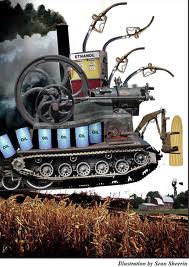Search
Democracy Links
Member's Off-site Blogs
the mistletoe machine .....

'Our military organization today bears little relation to that known by any of my predecessors in peacetime, or indeed by the fighting men of World War II or Korea.
Until the latest of our world conflicts, the United States had no armaments industry. American makers of plowshares could, with time and as required, make swords as well. But now we can no longer risk emergency improvisation of national defense; we have been compelled to create a permanent armaments industry of vast proportions. Added to this, three and a half million men and women are directly engaged in the defense establishment. We annually spend on military security more than the net income of all United States corporations.
This conjunction of an immense military establishment and a large arms industry is new in the American experience. The total influence - economic, political, even spiritual - is felt in every city, every State house, every office of the Federal government. We recognize the imperative need for this development. Yet we must not fail to comprehend its grave implications. Our toil, resources and livelihood are all involved; so is the very structure of our society.
In the councils of government, we must guard against the acquisition of unwarranted influence, whether sought or unsought, by the military-industrial complex. The potential for the disastrous rise of misplaced power exists and will persist.
We must never let the weight of this combination endanger our liberties or democratic processes. We should take nothing for granted. Only an alert and knowledgeable citizenry can compel the proper meshing of the huge industrial and military machinery of defense with our peaceful methods and goals, so that security and liberty may prosper together.'
Dwight D. Eisenhower -
With the ghost of Dwight Eisenhower hovering in the background, Reich noted that the US now appears hopelessly devoted to maintaining the economic activities of the military-industrial complex regardless of need, efficiency, or cost. Why? Because, he tells us, almost four million Americans are directly employed by either the military or military-related companies and corporations. This makes the military-industrial complex "America's biggest - and only major - job's program." It also makes the entire set-up politically inviolable. The distortions that result are labelled "nuts" by Reich.
The New York Times has described the situation this way, "There has been a feeding frenzy at the Pentagon budget trough since the 9/11 attacks. Pretty much anything the military chiefs and industry lobbyists pitched, Congress approved - no matter the cost and no matter if the weapons programs were over budget, underperforming or no longer needed in the post-cold-war world."
In total, the US spends close to a trillion dollars a year on "national defense" and "national security" related items. There is so much redundancy, inefficiency, and sheer fluff in all of this that Reich concludes that "national security is a cover for job security." One could probably cut the entire array of defense related expenditures by one quarter to one third and never lose a beat of one's security-related heart. That would be a quarter to a third of a trillion dollars that might be spent on schools, mass transit, health care, parks, sewer and water systems, alternative energy, job training and retraining, low-cost housing, the arts, fixing potholes, ad infinitum. In other words, funding all the things that help make up a vibrant civilization. But the advocates for such things, even the paid ones in Washington, seem not to be able to compete. In March 2005, 750 scientists at the National Institutes of Health lamented that money for basic research into infectious diseases was going instead into "bio-terror research." Things have not improved since then. But how many of us really care? Not the vast majority of those employed by the military-industrial complex. Locked into their "me first" localism, they can proclaim that they have theirs, and the rest of us can go to ... the unemployment lines.
What all this means, in the simplest of terms, is that in the United States there is no such thing as national interest. The nation appears to be nothing beyond the total of its pork-barrel sub-parts. And the most powerful of these are military related. If the US is something more than these parts, Congress should have identified that "thing" by now and honored it. There is no evidence that this has happened. Of course, national interest does exist in rhetorical terms. We hear it all the time. The phrase is always trotted out when you want to justify some demand in a way that leaves opponents open to the charge of being unpatriotic.
In addition, this all means that the largest spending operations in the federal government are carried on in a fashion that no competent household manager would tolerate for a minute. The General Accounting Office, which knows what is going on and often tries to expose the corruption of it all, is utterly incapable of changing the general way business is carried out. So the next time you hear a politician complain about the deficit, ask him or her about the bloated defense budget and watch them beat a hasty retreat. The next time you hear a legislator - federal, state or local - throw up their hands and say that there is just no money for public education, etc., ask them about those venal defense contractors. Chances are they will stutter and shuffle and smile like a ninny, or perhaps join you in your outrage.
- By John Richardson at 21 Aug 2010 - 8:54am
- John Richardson's blog
- Login or register to post comments
Recent comments
3 hours 38 min ago
3 hours 48 min ago
5 hours 24 min ago
6 hours 18 min ago
7 hours 19 min ago
7 hours 46 min ago
8 hours 38 min ago
9 hours 5 min ago
9 hours 41 min ago
1 day 5 hours ago